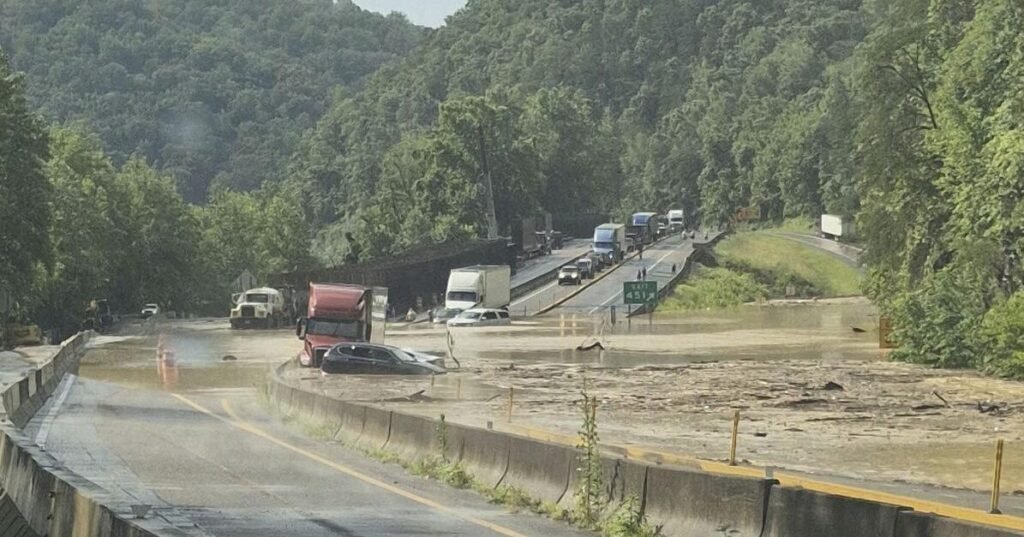I-40 Closed Again: Rock Slides and Flooding Shut Down Key Mountain Highway
As someone who’s explored the winding roads of the Smokies for over a decade, my heart sank when I heard the news. Interstate 40, that crucial lifeline connecting Tennessee and North Carolina through the majestic Great Smoky Mountains, is closed again. And this time, Mother Nature has delivered a double whammy.
Heavy rainfall on Wednesday triggered both significant flooding and a dangerous rock slide near mile marker 450, creating what local transportation officials are calling “a perfect storm” of highway hazards. Engineers now estimate the vital roadway will remain closed for at least two weeks while emergency crews work to clear debris and ensure traveler safety.
What Happened to I-40 in the Smokies?
The latest closure stems from Wednesday afternoon’s intense weather event that unleashed torrential downpours across the region. The narrow corridor where I-40 threads through the mountains has always been vulnerable to nature’s forces, but this latest incident demonstrates just how quickly conditions can deteriorate.
Having driven this stretch dozens of times myself, I can tell you it’s both breathtakingly beautiful and geologically precarious. The highway hugs the steep mountain terrain alongside the Pigeon River, creating spectacular views but also putting the roadway at constant risk from the unstable slopes above.
The Impact on Local Communities and Travelers
This closure isn’t just an inconvenience—it’s a significant disruption for both travelers and local communities. For tourists planning Smoky Mountain vacations, the detour adds hours to their journey. For truckers hauling goods across the country, it means rerouting through unfamiliar territory and potential delivery delays.
Local businesses in Hartford and nearby towns will feel the economic impact as well. When I spoke with shopkeepers in similar situations during past closures, many reported significant drops in customer traffic when the interstate shut down.
Alternative Routes While I-40 is Closed
If you’re planning travel between Tennessee and North Carolina in the coming weeks, you’ll need to prepare for detours. Here are the primary alternative routes:
- I-26 to Asheville then connecting to I-40 (adds approximately 45 minutes)
- US-25/US-70 through Hot Springs (scenic but slower)
- I-81 to I-26 for those traveling from western points
I’ve traveled each of these alternates numerous times, and while they add distance, they offer their own unique mountain views and experiences. Just be sure to check your GPS before departing, as some navigation systems may not immediately update to reflect the closure.
The History of I-40 Closures in the Smokies
This isn’t the first time this particular section of I-40 has faced extended closure. The corridor’s geological history makes it particularly susceptible to slides. In 2009, a massive rock slide closed the highway for six months, causing significant economic impact throughout the region.
What makes this stretch so vulnerable? The highway cuts through ancient metamorphic rock formations that have natural fracture lines. When heavy rain saturates these formations, it can loosen material and trigger slides. The steep terrain and narrow passage leave engineers with limited options for permanent solutions.
What to Expect for Reopening
Transportation officials have indicated that the two-week timeline is preliminary, and as anyone familiar with mountain road repairs knows, these estimates often stretch longer as crews discover additional damage.
The work ahead includes:
- Removing fallen rock and debris
- Assessing slope stability
- Repairing any damaged roadway
- Installing temporary protective measures
I’ll be following this situation closely and providing updates as they become available. The resilience of both the local communities and the dedicated road crews never ceases to amaze me during these recurring challenges.
Planning Your Travel During the Closure
If you’ve been planning a trip to the Smokies, don’t cancel just yet! Both sides of the mountains remain accessible—you’ll just need to adjust your route. The detours, while longer, take you through some equally beautiful mountain scenery.
For the most current information, I recommend checking the Tennessee Department of Transportation (TDOT) website or calling their hotline at 511 before departing. Local accommodations are also typically well-informed about road conditions affecting their guests.
Final Thoughts
As someone who has witnessed the Smoky Mountains through all seasons and circumstances, I can assure you that even this disruption is just another chapter in the ongoing story of these ancient mountains. They have stood for millions of years, occasionally reminding us of their power and majesty through events like this.
For travelers and locals alike, patience will be key in the coming weeks. The mountains have their own timeline, and safety must remain the priority as crews work to reopen this vital transportation link.

